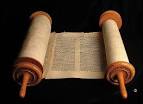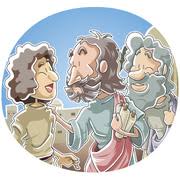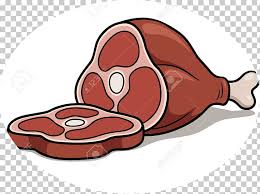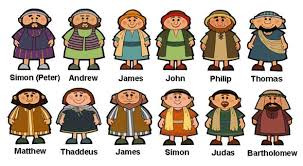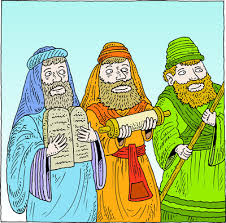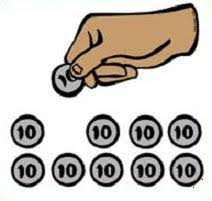Galatians 3:1 – O foolish Galatians! Who has bewitched you? It was before your eyes that Jesus Christ was publicly portrayed as crucified.
Well readers, hold onto your hats! Paul is about to launch into a deep proof of justification! And he is going to confirm this truth by the authority of the Old Testament.
 Paul describes the Galatians as foolish. The Greek word implies instability of character. In other words, they were prone to changing their minds, which made them an easy target for the false teachers.
Paul describes the Galatians as foolish. The Greek word implies instability of character. In other words, they were prone to changing their minds, which made them an easy target for the false teachers.
The false teachers are described as spiritual sorcerers, who bewitched the Galatians. The root word for bewitched means 'to mislead as by magic arts, to fascinate, to mist or dazzle the eyes'.
Using persuasive or dazzling speeches, the false teachers have succeeded in drawing the eyes/attention of the Galatians away from the true gospel, and focused it on a false doctrine of works, which could not deliver salvation.
Paul rebukes the Galatians for this - they should not have been fooled by these heretics! They had been clearly and logically taught that the sacrifice of Jesus had set them free from the bondage of the ceremonial law. The true purpose of the suffering and death of the Savior had been fully explained to them. In fact, it had been 'painted' to them as clearly as a picture or portrait of the crucifixion itself; they had been shown the living image of Christ through the gospel message. How could they take their eyes off this image of Christ and focus on the law?
Galatians 3:2 – Let me ask you only this: Did you receive the Spirit by works of the law or by hearing with faith?
Paul's use of the word 'only' implies that the answer to this one single question was enough to settle the whole issue: Did they obtain the Spirit/salvation by hearing the gospel or by practicing the law?
In this argument, Paul draws out the personal spiritual experience of the Galatians. This should be ample evidence to convince them of the truth. The truth is, when they heard the gospel, they repented and received Holy Spirit, as a sign of their salvation. Therefore, salvation is by faith alone; without the addition of works.
 This is a proof used multiple times in scripture. In Acts 10, when Peter preaches to the Gentiles for the first time, they received Holy Spirit without any works of the law. Since that was the case, Peter had them baptized and declared them part of the family of God.
This is a proof used multiple times in scripture. In Acts 10, when Peter preaches to the Gentiles for the first time, they received Holy Spirit without any works of the law. Since that was the case, Peter had them baptized and declared them part of the family of God.
Paul and Barnabas used this argument in their testimony before the Jerusalem Council, in the matter of law verses faith (Acts 15:2, 12).
Thus, the Galatians should have understood that the Spirit was not given when they performed acts of the law, but when they accepted Paul's preaching in faith.
It should be noted that there is a small debate over what is meant by receiving the Spirit. Everyone believes this refers to sanctification and eternal salvation of those who believe. But some feel it also entails the supernatural gifts of Holy Spirit which are given for the good of the church and the confirmation of the gospel. These are the gifts listed particularly in I Corinthians chapter 12. For myself, I believe it refers to both. What do you think?
Based on your own personal spiritual experience, how would you describe faith in Christ to another person?
Galatians 3:3 – Are you so foolish? Having begun by the Spirit, are you now being perfected by the flesh?
They key word in this verse is 'perfect'.
What definition instantly comes to mind when you hear this word? Most of us think of 'perfect' as being something without flaw, defect or blemish; something without error or fault.
But it also has another meaning, which is the one used by Paul in this verse. 'Perfect' also means finished or completed.
Here is Paul's argument: When we receive the Spirit by faith, we are renewed and sanctified by him. Our sin is gone and we can now experience a fulfilling relationship with God. We can worship him as he desires - in Spirit and in truth.
By contrast the flesh refers to the things of this world, particularly the observance of carnal or fleshly rites of the Jewish law. It refers to things that are outward, fading or already dead. Nothing in the fleshly or carnal realm can accomplish/finish/complete something that is spiritual. Carnal things simply have no authority or power to do anything in the spiritual realm; they are ineffective in that regard.
II Corinthians 3:4,6 – Such is the confidence that we have through Christ towards God, who has made us sufficient to be ministers of a new covenant, not of the letter but of the Spirit. For the letter kills but the Spirit gives life.
How then, can the Galatians expect to finish their spiritual journey through fleshly means? The obvious conclusion is that they cannot! To try and do so is simply absurd!
And yet, we see the same thing today, don't we? There are still people today who have received salvation by faith in Christ, but immediately focus on works. They attend church, teach bible study, tithe, etc but soon lose their thirst for spiritual growth. They confine themselves to following a list of rules and regulations – wear this, don't wear that; drink this – don't drink that; go here - don't go there; say this - don't say that, etc.
 Soon they begin to place faith in the righteous things they do, rather than in the simple but profound grace that Jesus has given us. They open a door in their lives for guilt and shame when they don't live up to their own expectations. Worse yet, they miss out on the intimate relationship that God desires to have with them. They are on a path of spiritual barrenness, disappointment and eventually death.
Soon they begin to place faith in the righteous things they do, rather than in the simple but profound grace that Jesus has given us. They open a door in their lives for guilt and shame when they don't live up to their own expectations. Worse yet, they miss out on the intimate relationship that God desires to have with them. They are on a path of spiritual barrenness, disappointment and eventually death.
I don't want to be that person, do you?
Galatians 3:4 – Did you suffer so many things in vain – if indeed it was in vain?
What or how did the Galatians suffer?
They probably ran up against opposition from the Jews who were very jealous for the law (like the circumcision party we saw in the last post). The Galatians had endured the rage of these men when they accepted salvation by grace alone. If they now abandoned that same grace in order to adopt the principles of the Jews who persecuted them, that would be foolish indeed; all of their suffering would be vain!
But we note that Paul's chastisement of the Galatians is not to condemn them or place them in despair – it is to clarify their error and give them the hope of returning to the truth. Thus, he says 'if' it was in vain, which indicates that all is not lost!
Galatians 3:5 – Does he who supplies the Spirit to you and works miracles among you do so by works of the law, or by hearing with faith –
Miracles were not produced by the keeping of the law. If they were, then the Pharisees and Sadducees would have been working miracles for years and years! Theoretically, any devout Jewish person would have been working them too! But this is not the case.
Instead, the evidence shows that miracles come through the anointing of Holy Spirit. Believers who accepted salvation by faith in Jesus were baptized in the Holy Spirit. This included both Jews and Gentiles (Acts 10:44-47, Acts 2:1-11). Through the anointing of Holy Spirit these people worked miracles, healed diseases, cast out demons, experienced supernatural wisdom and knowledge, and spoke with tongues, just to name a few.
The same would have been true of the Galatians. They no doubt had received Holy Spirit and personally experienced his power in their lives. How would it now benefit them to add works such as circumcision to their practice of Christianity?
Galatians 3:6 – just as Abraham "believed God, and it was counted to him as righteousness"?
What role does Abraham play in the lives of the Jews?
As you recall, God called Abraham to be the patriarch of the whole Jewish race. Accordingly, all Jews consider Abraham to be their father (John 8:39), and they have a very devout love and respect for him. His name means "father of a multitude".
The original covenant between God and his people was made with Abraham (Genesis 17:1-11). God met with Abraham face to face (Exodus 34). The scriptures even described Abraham as a friend of God (Isaiah 41:8, II Chronicles 20:7). So Abraham is an extremely important figurehead to the Jewish nation.
Paul is now going to show that the Jews most beloved ancestor/eminent patriarch was not saved by deeds of the law. He was saved by faith in God.
Genesis 15:6 - And he [Abraham] believed in the LORD; and he counted it to him for righteousness.
(See also, Romans 4:3). Do you see the significance of Genesis 15:6? Abraham believed God and was justified by faith hundreds of years BEFORE the Law of Moses was given to Israel! Therefore, obedience to the law could NOT be a requirement of justification. If it had been, Abraham could not have been saved.
Furthermore, if it wasn't necessary in Abraham's case, then it isn't necessary in any other case either. Consequently, the Galatians do not need to follow the law in order to be justified. This example demonstrates that the false teachers were wrong, even according to the Old Testament which they held so dear.
How then, was Abraham justified? He was justified by believing in the promise of God. When he received God's promise, he embraced it as being certain. If Abraham was justified by faith/believing in the promise of God, then all his offspring must be justified in the same manner.
Therefore, those who believe in the promise of salvation through the blood of Jesus will also be justified in God's sight.
Galatians 3:7 – Know then that it is those of faith who are the sons of Abraham.
The Jews prided themselves on being the flesh and blood descendants of Abraham – too bad they were nothing like him!
It can be argued that the most remarkable character trait that Abraham exhibited was his unrelenting, unwavering confidence in God and his promises. His true children are those who share this trait.
The true descendants of Abraham are those who have given up all confidence in fleshly works. They are people of every tribe, tongue and nation who place their hope of salvation on the mercy of God.
Galatians 3:8 – And the Scripture, foreseeing that God would justify the Gentiles by faith, preached the gospel beforehand to Abraham, saying, "In you shall all the nations be blessed."
The Old Testament states multiple times that all nations of the earth would be blessed in Abraham (Genesis 12:3, Genesis 18:18, Genesis 22:18). The word 'nations' can also be translated 'heathen' and it applies to all Gentiles.
So what we find here is that the seed of the true gospel message (salvation for all people through faith) was revealed in the scriptures long before the law was established.
The law certainly had its purpose. Among other things, it defined sin and showed mankind the need for a savior. But it could not redeem or justify mankind from sin. Only Jesus, the promised savior of the nations, could do that.
Galatians 3:9 – So then, those who are of faith are blessed along with Abraham, the man of faith.
Abraham was blessed because he had faith, not because he was circumcised. Abraham was blessed because he had faith, not because he was a Hebrew. Abraham was blessed because he had faith, not because he trusted in his own works.
If the Galatians wanted to be blessed with the hope of eternal life as Abraham was, it would come through faith, not works.
Galatians 3:10 –For all who rely on works of the law are under a curse; for it is written, "Cursed be everyone who does not abide by all things written in the Book of the Law, and do them."
Those who are seeking to be justified by the law must perfectly adhere to every single regulation, every single day, in every single way. It's all or nothing. You can't earn partial credit by doing well sometimes, but messing up other times. Even minor infractions cannot be overlooked. It's do or die. James conveys the same principle in this way:
James 2:10 – For whosoever shall keep the whole law, and yet offend in one point, he is guilty of all.
It doesn't take much for us to realize that keeping the law would be an impossible task.
 The problem is that if you fail to be justified by perfect obedience to the whole law, then you are guilty of breaking the whole law, and you are subject to the curses contained in it. The violator of the law is subject to eternal punishment, destruction and death.
The problem is that if you fail to be justified by perfect obedience to the whole law, then you are guilty of breaking the whole law, and you are subject to the curses contained in it. The violator of the law is subject to eternal punishment, destruction and death.
Therefore, it makes absolutely no sense for the Galatians to abandon the gospel of grace in order to try and keep the law. They have already failed in that regard!
Aren't you glad you live in the age of grace? What a blessing!
Galatians 3:11-12 – Now it is evident that no one is justified before God by the law, for "The righteous shall live by faith." But the law is not of faith, rather, "The one who does them shall live by them."
If the Galatians can't be justified by the law, how can they be righteous before God? By faith, of course!
There is only one way to obtain eternal life and all the other spiritual benefits and that is by living in faith.
Habakkuk 2:4 - ... the just shall live by his faith.
It may seem like the law and the gospel are opposite of each other, but that is not really the case. Rather, God has made them perfect compliments to each other.
The law reveals sin; the gospel gives us the remedy for it. The law points to the need for a savior; the gospel provides Jesus Christ our redeemer. The law shows us our entire duty to God; the gospel furnishes the means (grace) to perform that duty.
Only God could do something this amazing!
Galatians 3:13 – Christ redeemed us from the curse of the law by becoming a curse for us – for it is written, "Cursed is everyone who is hanged on a tree" –
This verse speaks about the curse that is inherent in the law. This refers generally to all the laws of God that he has made known to man. To break any of these laws is to sin; and the wages of sin is death or punishment in the future world forever. This is certainly the reality we would face if Jesus had not intervened.
 Paul says Jesus has 'redeemed' or literally ransomed us from the curse. What do you think of when you hear the word 'ransom'? In my mind, it conjures up pictures of a person tied up in a chair in some abandoned house, while robbers try to extort money from their family. It's a dismal and dreadful situation and the victim has no hope of escape, unless his family meets the payment demand.
Paul says Jesus has 'redeemed' or literally ransomed us from the curse. What do you think of when you hear the word 'ransom'? In my mind, it conjures up pictures of a person tied up in a chair in some abandoned house, while robbers try to extort money from their family. It's a dismal and dreadful situation and the victim has no hope of escape, unless his family meets the payment demand.
In some ways, this applies to us in the spiritual realm. We have been taken captive by sin. That sin keeps us bound up, without hope of escape. We are in a dismal and dreadful situation because we can't pay the price for our sin. But, Jesus came along and paid the ransom, setting us free from the bondage of the law.
He set us free by taking the punishment of our curse upon himself. He paid the ransom price with his own sinless blood, and we were set free from the bondage imposed by the law.
This proof of justification by faith is also taken from the Old Testament:
Deuteronomy 21:22-23 - And if a man has committed a sin worthy of death, and he is to be put to death, and you hang him on a tree: His body shall not remain all night upon the tree, but you shall surely bury him that day; (for he that is hanged is accursed of God;) that your land be not defiled, which the LORD your God gives you for an inheritance.
According to the Old Testament, the person who suffered for a transgression was considered to be bearing the curse of that sin in his body. That is why the Israelites were required to bury a criminal the same day he was executed – so that an accursed thing was removed from God's sight. Otherwise, the land would be considered polluted.
Galatians 3:14 – so that in Christ Jesus the blessing of Abraham might come to the Gentiles, so that we might receive the promised Spirit through faith.
The blessing which Abraham enjoyed was being justified by faith in God. Jesus has made it possible for any and all people, Jew or Gentile, to have this same blessing. He made it possible by paying the price of our sin. He did this so that by faith, we might receive the Spirit.
The Spirit is the source of all spiritual blessings. He seals us until the day of redemption, guaranteeing our salvation. Holy Spirit also influences and assists us in sanctifying ourselves and renewing our hearts. He comforts, leads and guides us. He displays the miraculous power of God through us. He is the manifest presence of God in our lives. What a blessing! As children of God we should love and cherish the Spirit of God. We should diligently seek to know him more intimately and open our lives to him more and more.
Let me offer you some encouragement and some relief:
Paul refers to the Galatians as being foolish, because they made a decision that made no sense. Their mistake was trading the freedom of grace for the bondage of the law. From our perspective, it seems obvious that they made the wrong choice, and we wonder why they did so.
But the truth is, we make foolish mistakes too. All of us have done something, said something, bought something or decided something that we wish we hadn't.
Maybe it was something like an unplanned pregnancy or an abortion. Maybe it was embezzling funds or some other crime. Maybe we mistreated someone or failed to be faithful in a relationship.
Here is some encouraging news – God forgives ALL mistakes, the foolish ones and the accidental/innocent ones. All we have to do is ask him in faith, and he will wash away our sin.
Forgiveness in God's sight does not magically erase the consequences of our actions. If we got caught stealing funds, we will still have to go to prison for our crime, even though God has forgiven us. But let me give you some relief – Holy Spirit dwells within us. So if we go to prison, he goes with us! He can comfort, lead and guide us in any and every situation. The blessing of Holy Spirit has been given to us by faith; no one can take it away from us!
Let me offer you some strength:
I wonder if the apostle Paul ever got frustrated. He fully and completely explained the gospel to people (especially the Jews) all the time, but they simply refused to understand the truth. They were willingly blind to the gospel message. Yet, Paul never gave up. Even while in prison he continued to teach, encourage and correct the church.
Maybe you also experience some frustration in your ministry. There are always people who will criticize what you do for the Lord or the church. But let me offer you some strength – we don't work for the approval of men, we work for the approval of God! So listen closely to Holy Spirit and follow what he instructs you to do. One day you will hear the Father say to you, "Well done, good and faithful servant!"


